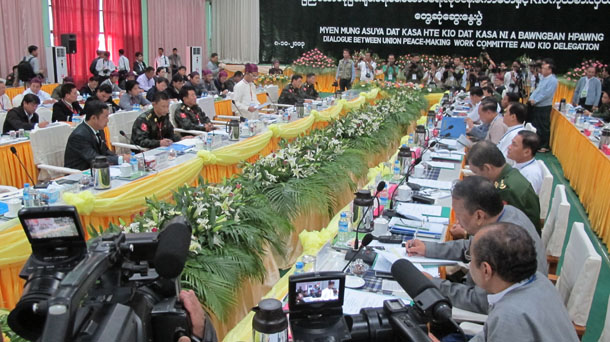Since taking office in 2011, Burma’s quasi-civilian government has been praised for introducing political and economic reforms. But in ethnic regions where decades of civil war have devastated communities, civilians say the reform package has brought much talk but little tangible progress.
International diplomats have repeatedly said that deep-rooted ethnic conflicts threaten to derail Burma’s move toward a democratic system. But ethnic minorities, who make up about 40 percent of the country’s population, say their needs have not been prioritized by the government, or by superpower nations making moves to forge closer ties with the Southeast Asian nation.
In war-affected regions, civilians say they enjoy more freedom after individual ceasefire deals were reached between the government and ethnic rebel leaders in late 2011 and early 2012. But in dozens of interviews, they also unanimously expressed doubt over ongoing peace talks, including efforts to secure a nationwide ceasefire, and said they feared clashes would continue.
Due to civil wars, more than 130,000 civilians fled to neighboring Thailand and took refuge over the course of about 20 years. According to The Border Consortium (TBC), 400,000 are also living as internally displaced persons (IDPs) in 36 townships in southeast Burma. Tens of thousands of people have been displaced in northern Burma.
At the Je Yang camp for IDPs in Kachin State, more than 8,000 civilians have sought shelter since clashes broke out between the Kachin Independence Army (KIA) and government troops in 2011, when a 17-year ceasefire between both sides broke down.
“In my life I have fled repeatedly from war while they talked about ceasefire,” La Htaw Brang Gun, a resident at the camp, told The Irrawaddy in November. “I’m now over 60 years old. I can’t even count how many times my family and I have fled from war and been displaced.”
“We want peace, for sure. We want the peace talks to be successful. But I still have doubts because I have suffered the consequences of war repeatedly, even though a ceasefire agreement was reached in the past,” he added, referring to the KIA’s 1994 ceasefire deal.
Ethnic minority groups that have been fighting against the governments for semi-autonomy since Burma gained independence in 1948 and are believed to have more than 100,000 soldiers combined. The KIA is one of two ethnic rebel groups that has not agreed to a ceasefire with the government since late 2011. But ceasefires are not always a sure sign of peace: In Shan State, for example, clashes have continued between government troops and the Shan State Army-North (SSA-N) or the Shan State Army-South (SSA-S), in contravention of ceasefires.
In January next year, rebel leaders and the government plan to meet again for talks, perhaps to push forward with a consolidated nationwide ceasefire agreement. But some Burma watchers are growing skeptical. Veteran Swedish journalist Bertil Lintner, the author of several books on Burma, said ethnic groups and the government have exchanged draft proposals for a nationwide agreement, but added that their demands are incompatible.
He said a main problem was that the Myanmar Peace Center (MPC), a government-affiliated organization that brings together ethnic and government leaders for negotiations, had no other mandate but to encourage ethnic armed groups to sign ceasefire agreements in exchange for economic benefits.
“That can never be the way forward,” he told The Irrawaddy. “No progress can be made until and unless political talks are held. Simply trying to bribe the leaders of the ethnic armed groups is not going to work. It will only create splits within those organizations.”
In some cases, civilians have criticized the dominant role of economic development in individual peace deals. As part of agreements, the government has offered business projects to rebel groups, with critics saying that projects will pad pockets at the top without offering real benefits to the majority of local people. In Karen State, the Karen National Union (KNU) received tax-exempt car licenses from the government, a gesture seen by some observers as bribery. Such offers have also led to internal divisions among ethnic leaders, with some supporting closer connections with Naypyidaw and others taking a more hardline approach.
Soe Aung, a spokesman for the Forum for Democracy in Burma (FDB), a Burmese opposition organization, called on the government and ethnic rebel leaders to agree on terms that would be beneficial to civilians, who were victims of forced labor, displacement, sexual assault and other violence during the wars.
“It seems to me that the regime’s terms are imposed to have an absolute upper hand over the ethnic armed groups,” he told The Irrawaddy. “Under such circumstances, there is no way that these peace negotiations can be successful in our lifetime.”
Among differing demands, the government has asked ethnic armed groups to disarm, while ethnic leaders have proposed the creation of a federal army combining 100,000 ethnic soldiers with the current 400,000-member government army. Ethnic groups have also called for constitutional amendments to create a federalist system, which would give more power to individual ethnic states.
Other key issues for civilians have seen little or no progress, as displaced families say they need assistance to return home, resolve land disputes and find employment. Land mines also continue to pose a major problem for their safe return.
Some observers worry that a nationwide ceasefire deal would earn the government praise internationally without actually offering many assurances to civilians on the ground. “Ethnic groups should make stronger demands,” said Aung Kyaw Zaw, a Burmese observer based on the China-Burma border. “They should initiate plans by themselves. They should not follow the government’s set-up plans.”
















